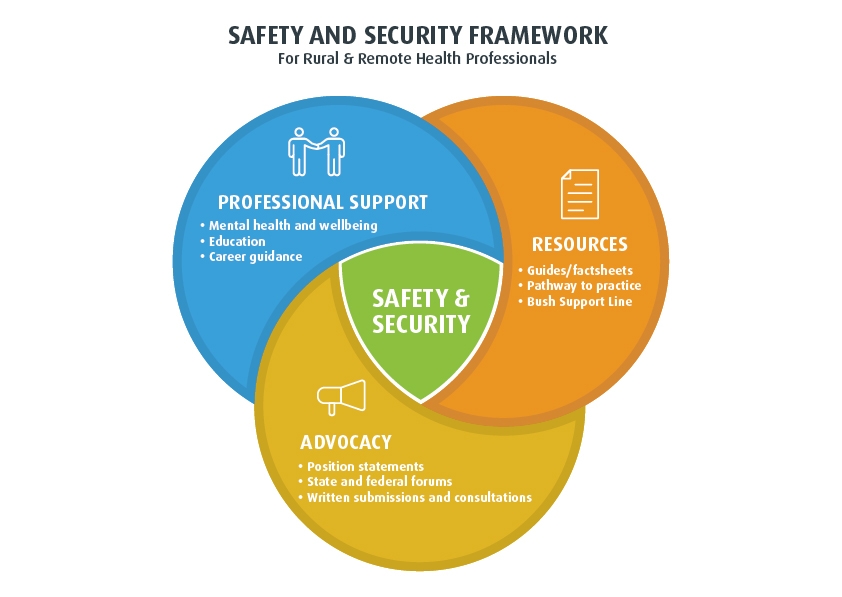This site may not work properly using older versions of Edge and Internet Explorer. You should upgrade your browser to the latest Chrome, Firefox, Edge, Safari, or any other modern browser of your choice. Click here for more information.
Safety & Security
The safety and security of the remote health workforce requires urgent attention from government, employers, and communities alike. Below, we introduce helpful resources to support your safety and discuss how CRANAplus is advocating to improve safety.
A career in remote health can be highly rewarding and present many professional opportunities, but it can also have its challenges. Remote health workers often report social, professional and geographical isolation, with services mostly provided in cross-cultural settings in communities with complex health needs. It is important to know and follow your organisation’s safety guidelines and procedures to support your personal safety and to develop resilience in facing the recognised challenges that arise.
A workforce survey conducted in 2020 by CRANAplus identified key issues including verbal abuse, bullying and harassment, motor vehicle accidents, dog bites, stalking and other intimidating/threatening behaviours, physical harassment, issues with equipment and infrastructure, and working alone. Many of these issues can be prevented or mitigated by sound risk management and following safety protocols and procedures.
These issues also correlate with an increased concern for personal safety and wellbeing, and cannot be separated from workforce sustainability and retention. The tragic death of Gayle Woodford in 2016 continues to underscore the need for urgent and ongoing attention to safety from government, employers and communities, and the full implementation of a ‘Never Alone’ approach to practice.
Improving the safety and security of remote workplaces
The safety and security of the remote health workforce has remained a longstanding priority of CRANAplus. The below framework depicts our three key areas of commitment: professional support, resources and advocacy.
Professional Support
- Mental health and wellbeing. Our wellbeing workshops teach skills to improve the wellbeing and mental health of remote health professionals. We produce resources on self-care, which can be sent to workplaces (email wellbeing@crana.org.au). We offer a free course on managing sensitive workplace conversations.
- Education. CRANAplus’ Safety & Security for Remote Health Professionals online module enables the remote workforce to better appreciate workplace safety guidelines and how they can be used to promote safety. We encourage professionals to complete AMRRIC’s Staying Safe Around Dogs in Remote Communities Videos and Module, a 4WDing course, our Working Safely in Community Night Patrol program, and Cultural Safety training, such as CATSINaM’s Murra Mullangari course.
- Career guidance. The LINKS Mentoring Program connects new-to-remote mentees with experienced mentors, building capabilities in clinical leadership, decision-making, and resilience. Our professional resources, including our Becoming a remote area nurse: essential knowledge module, equip the workforce with helpful information.
Resources
- Guides/factsheets. Our factsheets outline actions and processes employers, agencies, individuals and communities can take to establish and maintain safety and security in remote and isolated health workplaces. See all safety and security guides and resources.
- Pathways to Practice. The Remote Area Nursing Pathway Program provides a pathway to a remote nursing career. Our Pathway Incentive resource lists pathway support to encourage professional development. We offer Undergraduate Remote Placement Scholarships to facilitate preparedness.
- Bush Support Line. Our free, confidential, 24/7 telephone support line is open to all health workers and their families in rural, remote, and isolated communities. Call 1800 805 391 any time to speak with an experienced psychologist.
Advocacy
- Position statements. CRANAplus generates position statements on industry-wide issues to amplify the voice of the remote health workforce. This includes our cornerstone remote health workforce safety and security position statement.
- State and federal forums. Representatives of CRANAplus hold positions on steering, advisory and working groups, committees and governance bodies to represent the workforce, foster recognition of safety concerns, and advocate for effective solutions.
- Written submissions and consultations. Through public consultations, Senate Inquiries, Royal Commissions, online surveys, journal articles and other channels, CRANAplus’ submissions raise awareness of safety needs and advocate for appropriate solutions to governments, regulators and other bodies.
If you have ideas about how CRANAplus could assist further with safety and security or would like to be involved in our advocacy, please email professionalservices@crana.org.au
